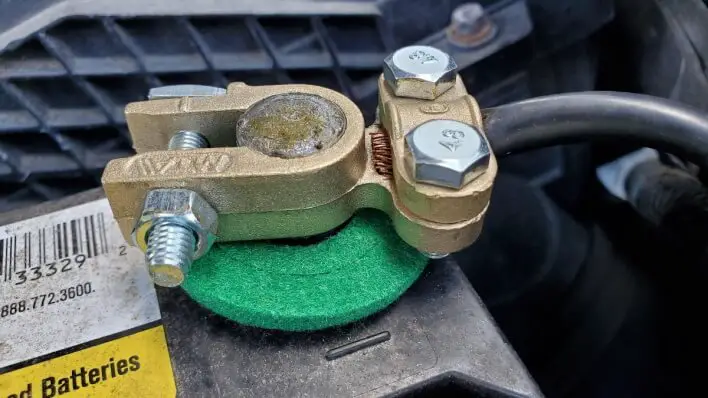Your car battery plays an integral part in assisting the engine. If your battery begins to fail, your engine can stall while you are driving. Cars can stall for various reasons, including loose battery terminals or damaged battery wires. It is normal to have a question regarding “can a loose battery terminal cause a car to stall?“ if you are unfamiliar with the subject matter.
The truth is that if your battery is failing, your car will be at risk of stalling. When your battery isn’t producing enough power, the alternator needs to work harder to keep the system running at its peak performance. This creates pressure on your car’s engine that causes it to stall out; thus, it’s a chain reaction. This article tries to inform you what would cause a vehicle to stall while driving and more related learning.

Loose Battery Terminal Symptoms
A corrupted battery terminal may cause your automobile to stall because the electrical system of your engine is driven by the battery. Symptoms of a faulty battery are similar to symptoms of a loose battery wire.
Some readers may not have experienced the stalling problem up to this point, and they may be inquisitive as to what happens if your battery terminals are loose. Below are a few symptoms:
1) Complete failure to start the car;
2) Apparent power loss while driving;
3) Batteries are becoming corroded;
4) Electrical power is interrupted;
5) Causes sluggish cranking or sharp clicking sound.
How Can I Prevent a Loose Battery Terminal From Causing My Car to Stall
The best way to prevent a loose battery terminal from causing your car to stall is to check the battery terminals regularly and make sure they are properly secured. Make sure the terminals are clean and free of corrosion and check the connections to ensure they are tight. If the terminals are loose, use a wrench to tighten them securely. If there is corrosion present, use a solution of baking soda and water to clean the terminals and connections.
Car Stalling Causes
Knowing why cars stop, can corroded battery terminals cause stalling and how to avoid them is a terrific approach to increase your safety. Let’s look at the possible causes of stalling and solutions.
1) Battery Problem
You may have a stuck car even if your battery isn’t failing. Corroded terminals might cause stalling because the engine relies on the battery for electricity. Inspect your battery wires for any signs of a faulty battery cable. If you find a point that a loose battery ground terminal would cause stalling, then repair it soon.
If you don’t have a voltmeter, take it to a mechanic who can quickly determine if your battery is dead. Then the mechanic will try many times to jump the car battery to start. It’s then possible to figure out if the problem is with the battery or the connections.
2) Fuel System Problem
Your fuel pump ensures that your engine gets enough gasoline. However, if it stops working, your car engine may be starved of gasoline, preventing effective oxidation.
Your fuel system might also impact your car’s performance. If it is over-fueling, it can flood the engine due to defective fuel injectors. Low fuel flow is frequently the reason for a car stalling up or downhills. Fractures in the inlet pipe, water in the gasoline, and a jammed fuel filter are all possible causes of engine stalling.
3) Missed Timing Belt
An engine’s timing belt or chain synchronizes the actions of many elements to ensure smooth and efficient operation. A worn or broken timing belt or chain might skip a gear, causing the engine to stall. Even more urgent, this situation might cause internal engine damage, so look for malfunctioning timing belt indicators and repair it as directed by the manufacturer.
4) An Electrical Error
While technology has made our lives easier, it can also cause problems for our vehicles. Today’s engines are controlled by processors and modules that must communicate to function. The components are unsure what to do without correct signals.
Problems with the electrical system might be caused by improperly connected or loose wiring or wires that are beginning to deteriorate. Whatever the origin of the electrical issue, it must be addressed by a qualified car mechanic.
5) Poor Airflow
You must maintain a clean air filter to help your engine run smoothly. Adequate ventilation ensures engine longevity. Dust and particles can cause stalling and other performance difficulties in vehicles.
The air filter can become clogged with ash, smog or other pollutants, reducing the air entering the engine and causing the car to stall. Keep your automobile functioning at its best, keep your air filter clean and have it often tested by your mechanic.
What To Do If Your Car Stall?
A vehicle stalling while driving can be frightening, so knowing what to expect and how to behave might help. If you have these issues, quickly steer the car to the side of the road and turn off the engine.
Start with the battery cables, as they are the easiest to examine and require no tools. The battery is safe to use and will not shock you. Always remove the negative, or black, cable first, then the positive or red. Installing the battery is red first, then black.
Remove the cables and inspect the battery terminals and clamps for corrosion. Try rotating the cord away from the battery terminal. Examine the clamps for rust and the cable for noticeable rips.
Once you’ve determined that loose wires are the issue, the simplest solution is to tighten the terminal screws. 10mm, 13mm, or 5/16′′ The ideal tool for the job is an excellent pair of wrenches. If you can’t discern the screw size by looking, try reading the engraving or using a basic ruler.
Slowly turn the screw to secure the clamp. If you force it too hard, the screw will tear through the clamp slots and break it. Repeat for the next clamp, then start the car. If the engine starts normally, you’ve fixed the issue. If not, then it’s wise to drive the car to the nearest qualified mechanic to diagnose and repair the problem.
How Can You Tell if a Battery Terminal is Loose
If a battery terminal is loose, it will often feel wobbly or won’t be connected firmly to the battery post. You can also check for corrosion on the terminals or posts, which could indicate the terminals are not connected properly.
FAQs
A loose battery terminal and a car stall have been often the top topic of queries. We’ve answered the top queries.
What Happens if the Battery Cable Comes Loose While Driving?
If your car stops suddenly while you are driving, then you might check the battery cable. Often loose battery cable might generate excessive resistance, causing troubles with your car’s electrical system. More than that, the battery may not charge completely, the vehicle may not start, and the car’s headlights may be dim.
Can a Bad Battery Cause a Car to Shut Off While Driving?
A dead or bad battery can halt your car’s engine while you’re driving. It indicates a problem with the car’s electrical and alternator system. So immediately, you need to see a mechanic to solve it.
Can a Loose Battery Cable Cause a Car Not to Start?
Yes, if your automobile won’t start, it’s usually caused by a loose battery connection. To check loose cables, open the hood and check the battery clamps. If they are loose, tighten them and try starting your car again.
Conclusion
Finally, we have reached the conclusion of the article on a loose battery terminal causing a car to stall or not. A modern car with an alternator will stall if the connection between the battery and the engine is slack or faulty. Because a faulty battery prevents the engine from receiving enough power to run properly, all other electrical activities will be irreparably damaged as well, maybe beyond repair.
So always check your battery cables regularly for any signs of a bad battery cable to make sure everything is in working order.
Read more:
About This Writer

Hi, I am responsible for the 'Homeowners Power Solutions' category. My name is Liam Jaxon and a licensed technician with 7 years of experience in vehicle batteries, electrical gadgets, and home appliances. My working experience in different residential & light commercial electrical sectors and the automobile industry helped to acquire vast knowledge in this industry.